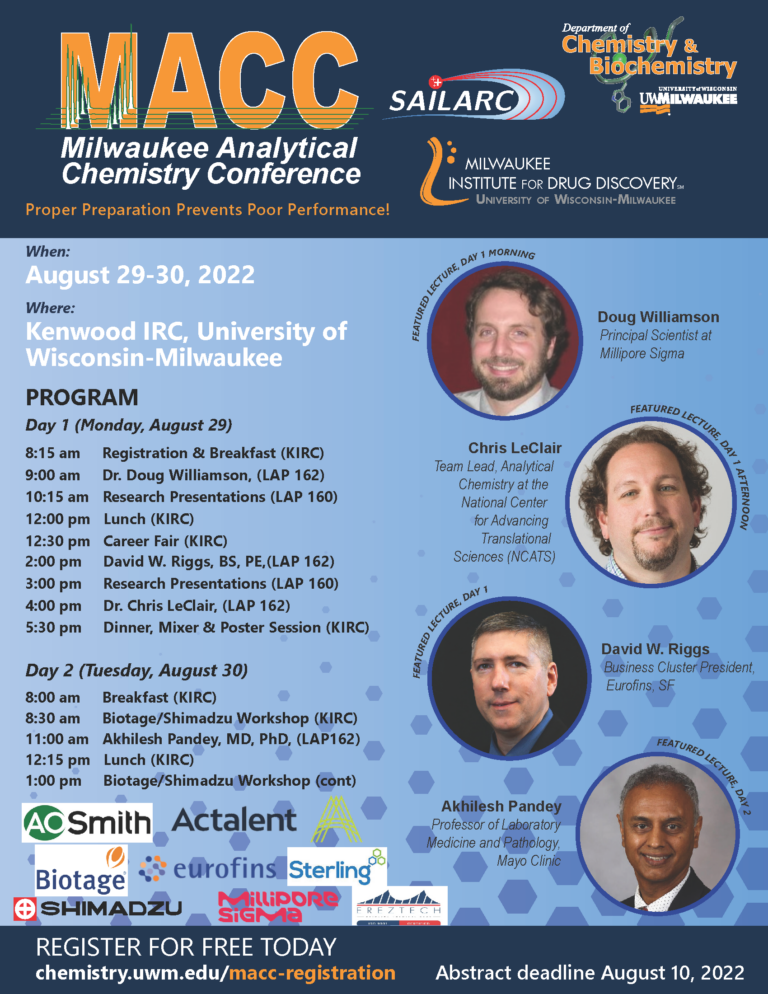
On August 29-30, 2022, the Department of Chemistry & Biochemistry and the Milwaukee Institute for Drug Discovery (MIDD) held the second Milwaukee Analytical Chemistry Conference (MACC) titled, “Proper Preparation Prevents Poor Performance”. After a two-year hiatus owing to COVID restrictions, we were delighted to host the conference again, this time as a dual-mode (in-person and virtual), two-day event. More than 100 people from local educational institutions, organizations, and companies attended.
After registration and breakfast, sponsored by A.O. Smith, the conference was inaugurated by Doug Williamson, Principal Scientist from Millipore Sigma, with a talk highlighting collaborative projects between the UWM Chemistry Department and Millipore-Sigma. Short talks presenting graduate student research followed. A job fair was held during lunch, sponsored by Sterling. The presenters from Actalent, A.O.Smith, Biotage, Eurofins, Millipore-Sigma, Shimadzu, and Sterling offered company overviews, job searching tips, resume reviews, and on-site interviews.
Following lunch and the career fair, David Riggs, Business Cluster President of Eurofins SF, kicked off the second part of the day with a talk titled, “Analytical Chemistry Applications for Ingredients, Food, Beverages, Pet Food, Dietary Supplements”. During his interesting and informative presentation, he discussed regulatory considerations for food, beverages, ingredients, pet food, and dietary supplements. He also gave an overview of physicochemical, microbiological, and analytical techniques, as well as a portfolio of analytical instrument platforms and their practical applications to solve common analytical problems. Actual case studies were discussed, highlighting how analytical chemistry and related techniques have been used to successfully solve challenging problems in the supply chain.
Short research talks by Profs. Alexander Arnold and Shama Mirza were followed by a plenary talk by Dr. Chris LeClair, Team Lead, Analytical Chemistry at the National Center for Advancing Translational Sciences (NCATS), titled, “Development and Implementation of High-Throughput Technologies and Automated Platforms to Improve Analytical Analysis Workflows”. His presentation outlined analytical chemistry as an essential component of the drug discovery and development process delivering vital data and analysis such as compound identity and purity, structural conformation, target engagement, therapeutic activity and efficacy, and omics-related biomarkers. The role of the Analytical Chemistry Core (ACC) within the Division of Preclinical Innovation (DPI) supports translational research throughout NCATS and provides analytical chemistry services.
The first day of the conference ended with a dinner sponsored by Millipore-Sigma that was accompanied by a mixer and undergraduate and graduate student poster sessions. Brenden Chasteen was awarded first place for the best undergraduate student poster. Brenden transferred to UWM in the summer of 2020 from the College of Charleston intending to major in biology. He reached out to Dr. Woehl in the fall of 2021 and received a research opportunity in Spring of 2022 where he continue his academic path with plans to apply for graduate school and eventually earning a PhD in physical chemistry. Kayode Medubi was awarded first place for the best graduate student poster titled “Optimization of a LCMS-MS method to quantify DAW-III-30 and determination of its metabolic stability”. Kayode started at UWM in Spring 2022 and joined the Arnold Group in summer 2022. His research is focused on the preclinical evaluation of drug candidates using mass spectrometry. Both poster awards were sponsored by Actalent.
The second day included analytical workshops. Biotage presented about their new product line for HPLC sample preparation. Shimadzu focused their workshop on GC sampling and PFAS analysis. The feature talk of the second day was presented by Akhilesh Pandey, Professor of Medicine and Pathology at the Mayo Clinic, titled, “Proteomics and Glycoprotoemics for Translational Research”. He talked about the power of mass spectrometry as an analytical tool in clinical applications including the most recent SARS-CoV-2 detection. A highly sensitive MS-based assay for accurate diagnosis of SARS-CoV-2 infection from nasal swab samples has been developed. Using quantitative proteomic and glycoproteomic analysis, novel molecules previously not described in viral infections were detected. In addition, studies on congenital disorders of glycosylation by profiling patient-derived fibroblasts and plasma to detect N-linked glycopeptides in a global fashion were presented. His talk was followed by a Eurofins-sponsored luncheon.
Based on the success of our first and second iterations, we are currently planning MACC 2023. Please send us your suggestions and comments. If you attended this year’s Milwaukee Analytical Chemistry Conference and would like to provide feedback, please do so here: https://uwm.edu/chemistry/post-macc-survey.
We would like to thank all of our sponsors – Actalent, A.O.Smith, Biotage, Ereztech, Eurofins, MilliporeSigma, Shimadzu and Sterling – for their generous support, which enabled us to offer you the MACC on the UWM campus free of charge.